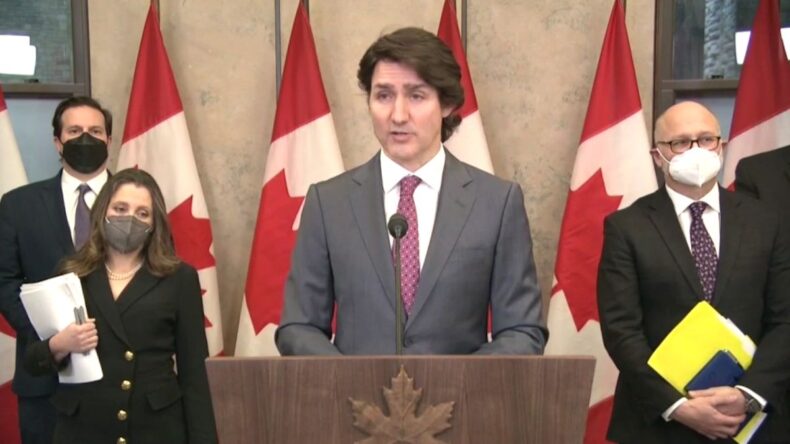Prime Minister Justin Trudeau has invoked the Emergencies Act for the first time in the history of Canada. This will give his government enhanced authority in response to the anti-vaccine mandate protests and blockades affecting Canada.
The law will grant Mr. Trudeau’s government’ special temporary measures that may not be appropriate in normal times’ for 30 days – including the power to prohibit public assembly, travel, and the use of a specific property.
The move comes amid weeks of disruptive – and expensive – demonstrations against Covid-19 restrictions.
The deployment of the Emergencies Act gives police more tools to restore order in places where public assemblies constitute illegal and dangerous activities, such as blockades and occupations, Trudeau said. “This is about keeping Canadians safe, protecting people’s jobs, and restoring confidence in our institutions,” he added while addressing a press conference. The government is securing critical areas such as border crossings and airports. With the help of this act, the government can use towing services to remove trucks and make sure that other essential services are rendered.
Financial Implications of the Act
The government is also going after financial support for illegal activity associated with the protest.
Convoy organizers have raised millions of dollars through the GoFundMe crowdfunding site. When GoFundMe shut their fundraising campaign down, the organizers started using the Christian crowdfunding site GiveSendGo.
The finance minister, Chrystia Freeland, said that the Canadian financial institutions can now temporarily stop providing financial services if they suspect an account is being used to support illegal blockades and occupations.
Under the Emergencies Act, crowdfunding platforms and the payment service providers they use must register with the Financial Transactions and Reports Analysis Centre of Canada (FINTRAC), the national financial intelligence agency. They must also report large and suspicious transactions to FINTRAC.
What do Other Political Leaders Think?
Many political leaders are not in favor of invoking the emergency act. The NDP Leader Jagmeet Singh said that while he sees the prime minister’s decision to turn to the Emergencies Act as “proof of a failure of leadership,” he will support the declaration — which should secure its passage through a minority
“The reason why we got to this point is that the prime minister let the siege in Ottawa go on for weeks and weeks without actually doing anything about it, allowed the convoy to shut down borders without responding appropriately,” he said.
Interim Conservative Leader Candice Bergen accused the prime minister of dividing Canadians.
“We’ve seen the prime minister wedge, divide and stigmatize Canadians he doesn’t agree with, and by doing so, he creates so many barriers in terms of trying to solve this problem,” she said.
“The prime minister had the opportunity to talk and listen to so many he disagreed with, and he refused. This looks like a ham-fisted approach that will have the opposite effect.”
Conservative MP Pierre Poilievre — the only person so far running to lead his party — said the way to end the protest and illegal blockades is to remove the mandates.
The Emergencies Act has never been applied before. The law was considered in the early days of the pandemic under the public welfare category but was ultimately ruled unnecessary.
A predecessor of the law, called the War Measures Act, was used thrice in Canadian history: during the First World War, the Second World War, and, most controversially, by Prime Minister Pierre Trudeau – Justin Trudeau’s father – during the October Crisis.
Edited by- Subbuthai Padma
Published by- Radhika N












